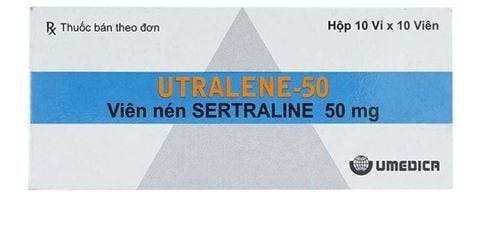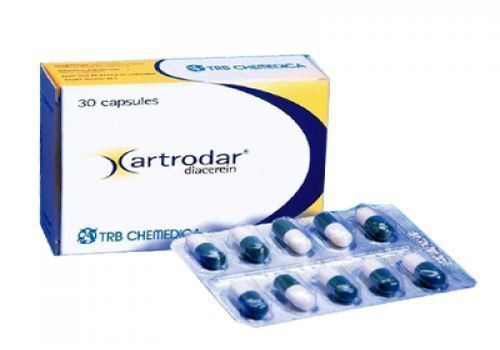This is an automatically translated article.
Pramebig is used to treat pathological problems in the gastrointestinal tract. This is a prescription medication that needs to be taken as directed by your doctor. Here are a few shared information to help you understand what Pramebig and Pramebig are used for.
1. Uses of the drug Pramebig
Pramebig is a pharmaceutical drug that is used to treat drugs of the digestive system. The active ingredient in Pramebig is Esomeprazole. Thanks to this ingredient, Pramebig can treat the syndromes related to diseases in the stomach. Usually, when the indications for the use of Pramebig are:
Treatment of ulcers detected in the gastrointestinal tract; Treatment of gastroesophageal reflux syndrome that may be associated with gastric ulcers caused by reflux. treatment of Zollinger Ellison syndrome Each patient's different manifestations will have a certain influence on the indication to use the drug from the doctor. Not always the cases mentioned above can use Pramebig. As with a few other cases, the doctor may ask the patient to use Pramebig to treat.
When using Pramebig, the patient needs to find out what Pramebig is. At the same time, you can consult your doctor or pharmacist to understand and know the use of Pramebig. Always check all medications carefully and consult your doctor before taking them to avoid misuse or serious health effects.
2. Dosage and how to use Pramebig
Pramebig is available as a coated tablet for oral use. After swallowing, the drug will begin to dissolve and absorb into the intestinal wall to handle the patient's problem. When using, users should pay attention to swallow whole tablets to avoid chewing or crushing, affecting the use or causing ineffectiveness when the drug reaches the intestines.
Dosage of Pramebig is decided after the user knows his/her medical condition. Currently, young children are not recommended to use drugs. Studies have not yet given firm conclusions about the degree of benignity when treating young children with Pramebig. You can refer to a few doses for patients experiencing the following cases:
Increased acid secretion leading to indigestion should use a dose of 10 - 20 mg per day. This dose usually lasts for 2 - 4 weeks under medical supervision. Treatment of GERD typically involves a single dose of 20 mg per day. Patients usually take about 1 month to recover, but if the effect is not achieved, the drug can be used for another 1-2 months for follow-up. If necessary, the doctor may double the dose to 40 mg per day to treat persistent gastritis that does not go away. After treatment of gastric ulcer, if necessary, a maintenance dose of 20 mg or 10 mg can be used for patients with gastric acid reflux. Treatment of patients with ulcers of the digestive system requires a dose of 20 mg per day. For acute or severe conditions, 40 mg can be used. After 1 month of treatment, if the patient detects peptic ulcer, the drug can be extended for another 1-2 months. After the end of treatment, patients at risk of relapse can continue to use Pramebig every day at a dose of 10 - 20 mg. Eradicating Helicobacter pylori causing peptic ulcers can be combined with dual or triple therapy. In this treatment plan, the doctor will specifically prescribe Pramebig and a combination antibiotic dose to increase the effectiveness of the drug. Treatment of gastric ulcers in patients following non-steroidal anti-inflammatory drug therapy using the usual dose of 20 mg daily. For patients with a history of gastric damage but using non-steroidal anti-inflammatory drugs, they should ask their doctor to consider combining treatment with Pramebig. Treatment of Zollinger Ellison syndrome requires a dose of 60 mg. In some severe cases, a dose of 120 mg may be required. With a dose of 120 mg, it should be divided into 3 times and doses from 80 mg can be used 2 times. Patients who accidentally inhale acid during anesthesia may need 40 mg of Pramebig 2 to 6 hours before surgery. Patients with renal failure are not affected by Pramebig. If the patient has hepatic impairment, the doctor should be informed to ensure that the dose does not exceed 20 mg. Elderly people can continue to use the same dose as usual patients.
3. Notes before taking Pramebig
Before using Pramebig, patients should be aware of the risk of effects due to hypersensitivity to any component of the drug. Especially some of the following ingredients:
Esomeprazol Omeprazol Benzimidazole derivatives The risk of drug interactions due to the influence of the drug components should be ruled out first. The patient's health status is then assessed. If you find sensitization or irritation, you should talk to your doctor to change the medication to have less effect.
4. Side effects of the drug Pramebig
Dizziness, headache, headache, Drowsiness, Vomiting, Diarrhea, Constipation, Bloating, abdominal pain, Fatigue, difficulty sleeping, Memory loss, Skin rash, itching, Peripheral nerve swelling, Uncontrollable sweating, High fever, Shock anaphylaxis Rapid decline in the number of blood cells Reversible intellectual impairment Aggression or negative psychological changes Auditory dysfunction Gastritis Candida infection Dry mouth Hepatitis causes jaundice Cerebral coma in patients with liver failure Bronchospasm Swelling pain stiffness Interstitial nephritis Side effects of Pramebig may be common or rare depending on the individual patient. The above side effects have been found and evaluated in terms of intensity of occurrence in decreasing order of magnitude. In addition, you may experience other rare or undetected reactions that can seriously affect the outcome of treatment. To ensure minimal side effects for patients, each patient should actively check their health periodically and discuss with their doctor when necessary.
5. Interactions with Pramebig
After using Pramebig, the patient may experience weight loss or prolonged vomiting. You should be aware if the stool color changes especially to black. Please pay attention to check the prevention of stomach ulcers or the appearance of malignancies to promptly handle them early.
Pramebig should not be used concurrently with other drugs that act as proton pump inhibitors. Some drugs need to be carefully studied before use to avoid interaction situations that prevent the body from absorbing vitamin B12. Avoid concomitant use of Clopidogrel and Pramebig.
Patients with hypomagnesemia requiring PPI treatment may experience some of the above common side effects. To avoid this effect, you should inform your doctor for advice on stopping the drug when necessary. Patients should regularly measure magnesium levels to promptly control when there are dangerous manifestations. PPIs should be avoided long-term, as research has found this to be a factor in bone health. At the same time, you should talk to your doctor so that you can promptly supplement calcium or vitamin D if needed.
Pregnant women and workers using machines have not yet detected Pramebig drug interactions. However, you should consult your doctor before using the drug. The use of Pramebig is to treat gastric reflux and some lesions in the digestive tract. This is a drug that can have serious effects when used improperly. You should go to the hospital to check with your doctor before using it.













